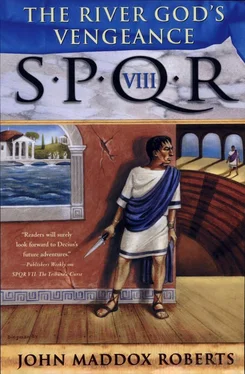John Roberts - The River God
Здесь есть возможность читать онлайн «John Roberts - The River God» весь текст электронной книги совершенно бесплатно (целиком полную версию без сокращений). В некоторых случаях можно слушать аудио, скачать через торрент в формате fb2 и присутствует краткое содержание. Год выпуска: 2004, ISBN: 2004, Издательство: St. Martin, Жанр: Исторический детектив, на английском языке. Описание произведения, (предисловие) а так же отзывы посетителей доступны на портале библиотеки ЛибКат.
- Название:The River God
- Автор:
- Издательство:St. Martin
- Жанр:
- Год:2004
- ISBN:9780312323196
- Рейтинг книги:4 / 5. Голосов: 1
-
Избранное:Добавить в избранное
- Отзывы:
-
Ваша оценка:
- 80
- 1
- 2
- 3
- 4
- 5
The River God: краткое содержание, описание и аннотация
Предлагаем к чтению аннотацию, описание, краткое содержание или предисловие (зависит от того, что написал сам автор книги «The River God»). Если вы не нашли необходимую информацию о книге — напишите в комментариях, мы постараемся отыскать её.
The River God — читать онлайн бесплатно полную книгу (весь текст) целиком
Ниже представлен текст книги, разбитый по страницам. Система сохранения места последней прочитанной страницы, позволяет с удобством читать онлайн бесплатно книгу «The River God», без необходимости каждый раз заново искать на чём Вы остановились. Поставьте закладку, и сможете в любой момент перейти на страницу, на которой закончили чтение.
Интервал:
Закладка:
“May I know what we are looking for?” the freedman asked.
“At the moment I am interested solely in the public contracts. But not tax farming. Specifically, the work of civic construction and demolition, and I would very much like to see the name of one Marcus Caninus in there.”
The freedman sighed. “All right, let’s get to it.” To the slaves: “Break them down by subject first before looking for specific names. Place all relevant documents here,” he rapped on the center of the table. “All others are to be returned to their proper bins. When all the irrelevant documents have been eliminated, we shall divide the remainder and each search for the things the honored aedile needs to know.” This seemed like an eminently sensible system to me. I don’t know what we would do without the State freedmen. They keep the Empire going while we enjoy the loot.
“Splendid,” I commended him. While this first stage of the labor was underway, I paced along the colonnade enjoying the fine view of the Forum, which, due to the aforementioned rivalry between Caesar and Pompey, looked better than it had in years. The rivalry was still friendly at that time, and all Rome profited from it. Each man sought to refurbish buildings and monuments to the glory of his own family.
Pompey had repaired all his father’s monuments and had renovated the Temple of Castor and Pollux in his own name, but he had saved the really spectacular work for his immense theater and its adjacent complex of public buildings out on the Campus Martius.
Caesar, whose family was far more ancient and extended, had done more in the Forum. As Pontifex Maximus he had restored the house of the Pontifex Maximus and the adjacent House of the Vestals, along with a restoration of the Temple of Vesta, which he had had the good taste to leave in its simple, primitive form. He had restored the trophies of Marius, a gesture much appreciated by the commons, who still worshipped the crazy old butcher. Marius had been Caesar’s uncle by marriage, and the old Marians were still his main power base.
As aedile he had completely repaved the Forum and its adjacent markets and renovated every building associated with his family. It was one of the most ancient, so that was a lot of buildings.
I pondered this profusion of white marble and brilliant gilding admiringly, comforted in the knowledge that these two great men were willing to squander such immense sums to buy the goodwill of their fellow citizens. There was only one grating fact to mar my pleasure. I couldn’t see the front of any new or renovated building without reading their names.
Looking out over the roof of the Temple of Saturn, I saw a group of men round the corner of the Basilica Sempronia. All wore green tunics, and something in the swagger of their walk said they were up to no good.
“Hermes,” I said, “come here.” He put down the scroll he had been studying and leaned on the waist-high railing, his sharp gaze following the path of my pointing finger. “Please tell me those are slaves from the stables of the Green Faction.”
“I suppose I could,” he allowed, “if you didn’t mind me lying to you. Those are Plautius Hypsaeus’s men. There are so many gangs these days that they’ve taken to wearing different colors to keep each other sorted out during the street brawls.”
“So that’s why the last dead Clodians I saw in the streets had orange stripes on their tunics,” I said.
“And why Milo just gave all his men new white tunics, although he claims it’s just so they’ll look smart when they follow him around in public. Aufidius’s boys have red borders on their tunics, Scaevola’s wear sky blue-” He went on, reciting a list of lesser mobs, each now with its own insignia.
The Plautius Hypsaeus he mentioned was yet another of our political gangsters. Like Milo, he was a candidate for consul for the coming year. It says much of Roman politics of the time that three candidates for the highest offices were gang leaders.
“Uh-oh,” Hermes said. “Look over there.” He was pointing to another group of men crossing the Via Sacra near the Temple of Venus Cloacina to the north. These had the same swagger, and their tunics were red bordered. Aufidius was a lesser gangster, but he supported Milo, Hypsaeus’s rival. “A silver denarius says they’re fighting before the redstripers are past the urban praetor’s platform.” Bloodthirsty little wretch.
“Not a chance,” I said. “They’re outnumbered, so they’ll run over there to Sulla’s Numidian War monument and put their backs against it, if they’ve got the sense of a goose.”
“Done,” Hermes said. “If first blood falls between the platform and the monument, the bet’s off.”
As I had anticipated, the two little mobs caught sight of one another across the Forum and stopped in their tracks like two dog packs with their necks bristling. I could almost see their fingers moving as they counted; then the men in green charged forward as those with the red stripes sidled toward the old monument, one Caesar had never bothered to restore since Sulla had been his enemy and had stolen the glory of that campaign from Marius. The red-striped Aufidians just managed to reach the monument and turn at bay as the Hypsaeans caught up with the hindmost man and brought him down with a brick. Hermes slid the denarius along the railing toward my hand. I picked it up and tucked it beneath my belt.
Down below, some women started screaming, and people mounted the steps of temples and basilicas to enjoy the show. The bullies of these gangs were often ex-gladiators who had served their time, so there was sometimes skilled fighting to be seen.
When neither side could make the other run with sticks and bricks, the forbidden blades appeared and the blood began to fiow in earnest.
“New bunch!” Hermes cried, as a little gang of men wearing yellow headbands ran in from the direction of the Temple of Vesta and attacked the green-wearers from behind.
“Who are these?” I asked Hermes.
He shrugged. “Never saw them before. They’re good.”
A general engagement now prevailed in the Forum. A few veteran brawlers wearing no discernible colors had joined in, apparently just for the fun of it. The state freedman who, along with his staff, had been ignoring all the noise, turned from his records at a renewed outburst of screaming and looked at the fighting mob disdainfully.
“Rome should have a decent police force. I am from Pergamum, and my city has never been disgraced by such a scene.”
“We’ve always done well enough without police,” I said. He was right, of course. Rome desperately needed a reliable police force, but you don’t just admit such a thing to a foreign-born freedman.
“If this is doing well enough, you can have it,” he said, turning back to the stacks of documents.
Foreigners often act as if law and order were the highest of civic virtues, especially those from the civilized and monarch-ridden eastern part of the world. Romans were disorderly in those days, but at least they didn’t spend their lives kissing the backside of a king. Unlike now.
Hermes and I enjoyed the show in the Forum for a while longer. Two well-known swordsmen of the day, Thracian dagger fighters, climbed on the monument and dueled to great applause and encouragement. Hermes won his denarius back on that one. On the whole, although it lacked pomp and solemnity, gilded armor and colorful plumes, it was almost as good as the munera .
“Aedile?” said the freedman. “As much as I hate to interrupt your-”
“Think nothing of it,” I said, waving aside his apology. “It’s all but over. Nothing much left to do except mop up the blood. What progress have we made?”
“ We ,“ he said, emphasizing the word, “have separated all the documents relating to the public contracts let by authority of that censorship. I have marked two that featured the name you mentioned.” The stack he indicated was much reduced but still substantial.
Читать дальшеИнтервал:
Закладка:
Похожие книги на «The River God»
Представляем Вашему вниманию похожие книги на «The River God» списком для выбора. Мы отобрали схожую по названию и смыслу литературу в надежде предоставить читателям больше вариантов отыскать новые, интересные, ещё непрочитанные произведения.
Обсуждение, отзывы о книге «The River God» и просто собственные мнения читателей. Оставьте ваши комментарии, напишите, что Вы думаете о произведении, его смысле или главных героях. Укажите что конкретно понравилось, а что нет, и почему Вы так считаете.










